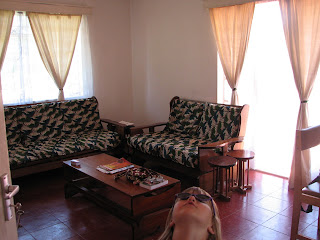The Universal Language of Soccer
The Universal Language of Soccer
We have been living in Tanzania for more than 6 weeks now and it has truly been an experience beyond all others. We have worked hard to become part of our little rural, mountainous community of Kilema, Kilimanjaro and, in return, have received nothing but the warmest welcome from these wonderful people whose spirit of giving seems endless.
When I look back on how we became friends with these hard-working, impoverished people, I realize that it was soccer, and the universality of its language, that brought us together.
Not long after we arrived, my husband Roman, and, my eight year old son, Jack, insisted that we take our new soccer balls out to the field behind the hospital. School had finished for the day and children were milling around the field behind the school. When they saw Roman and Jack with the soccer balls in hand they quickly made their way over to where we were. I wish I had my camera because the site of more than 300 African children yelling in Kiswahili and running towards my unsuspecting family was something to behold. The children quickly made it known that what they wanted was to play soccer, with the first real soccer ball that many of them had seen in years. You see, the children in this region are poor, with the average family income at less than $30 per month. Most live in small dwellings with no running water or electricity. Although they all wear a school uniform, most are threadbare bits of clothing that resemble what was once a school uniform. The children carry water in old gasoline containers or bundles of wood on their heads to school each day so that they can help to prepare their noon meal which is provided through the school; typically a bowl of corn maize and beans. For some it is the only meal they will have that day and many display the tell-tale signs of protein malnutrition and vitamin deficiencies.
On that day it wasn't long before their game got off to a raucous start with most of the older boys holding onto the ball and running for the end of the field. Roman, through plenty of hand signaling managed to get a game underway. Jack was beaming from ear to ear…he really looked like he had finally found something in common with these children who lived such completely different lives; the love of soccer.
As the afternoon progressed, a group of older youth, and, men in their early twenties also started to appear on the field. Jack and the remaining boys moved their game to the other end and Roman and the men quickly got a lively game of soccer organized. These young men, mostly unemployed youth (as unemployment is more than 30% in this age group in Tanzania), played for more than an hour and a half. Roman worked up quite a sweat and a referee soon appeared with a whistle to officiate the game. We officially had our own Tanzanian soccer team.
Since that day, there have been endless hours of soccer. Roman, and Jack, the 'Mzungu Kakas', which means White Brothers in Kiswahili is expected at the field each day at 4:30 in the afternoon. And the men have appeared almost everyday, rain or shine, with snow peak of Mount Kilimanjaro sitting majestically behind them. The local priest has now officially welcomed Roman to the community in a formal celebration, and thanked him for working hard' to bring a ‘new life’ to the young men in the community. Indeed, other volunteers and locals alike have told us that there is an energy here that seems to build when foreigners come and live and work. Perhaps, seeing others investing time in your community motivates you to give a little bit more, even when many people here feel they have nothing left to give.
Since that day, the 'Kilema Soccer Team' has walked to neighboring villages for impromptu matches where it seems that the whole community has come out to see, my husband, the Mzungu Kaka, work his magic. What is most incredible is that all of this has developed with Roman and these young men never uttering a word that the other can really comprehend.
In our experience, soccer truly has broken down barriers of income, race, and, language. The language of soccer, and any sport, can be universal. It requires no money or special skills, just a love of the game and good sportsmanship. Wouldn't it be wonderful if we could take that philosophy beyond the soccer pitch and into so many other aspects of our lives. I believe that the world would surely be a better place.



























